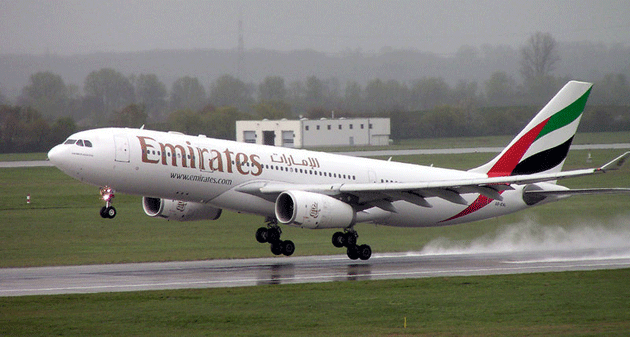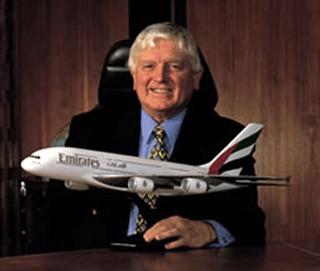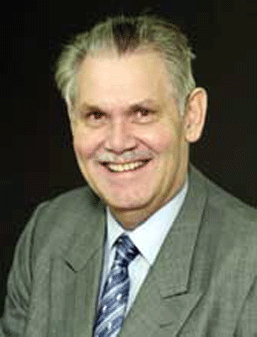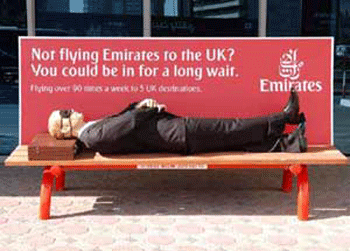Straight
From The Shoulder
Right From The Heart

 We
are relaxed in the confines of Maurice Flanagan’s office, headquarters
to the Group Chairman and co-founder of Emirates Airline. We
are relaxed in the confines of Maurice Flanagan’s office, headquarters
to the Group Chairman and co-founder of Emirates Airline.
The table is decorated with tea and cakes.
It is morning and the sun is running up the sky; it is a clear and cooler
than normal day in the desert.
This is a jackets-open session for Mr. Flanagan
and his aide-de-camp and airline chief corporate spokesman Mike Simon.
Newspapers in town have been running stories
of the launch by Virgin Atlantic of thrice weekly service from London
into Dubai.
At this point, speculation abounds on the
“gee-whiz” trick Virgin public relations is cooking up for
Richard.
It is no secret that VS, anxious to get
a toe-hold anywhere as the hot breath of Singapore Airlines (49% owner)
is keenly felt, has dumped fares and millions across the route at start
up.
At 78 years old, Flanagan looks great and
will apparently work for as long as he wants to. He looks to his old friend
Mike for a moment and levels his gaze.
“Another airline?
“Airlines are good for Dubai and business
here. We are completely in support of open skies.
“Anybody can fly into DXB and the
government encourages it.
“As far as schedules go, I think service
three times a week to any location is a half measure,” he adds.
“‘Daily’ is the way to
go if you want to build a service.”
Emirates knows something about building.
With annual numbers about to be published,
the airline that turned twenty last year and reached a 100 aircraft fleet
last month has single handedly turned the world of commercial aviation
upside down with style and class and a program that has the company en-route
to doubling itself every three years.
SkyCargo is a first-class example, a worldwide
sensation that is presently at the doorstep of becoming a one billion
dollar business.
Emirates has become the 21st century innovator,
changing long haul passenger and cargo traffic the way Southwest Airlines
changed budget airlines.
Other carriers have been in the game a bit
longer. Singapore, Qantas and KLM come to mind when thinking of originators
of the form.
KLM started up more than 80 years ago, flying
tiny Fokker aircraft from AMS to a little place called Batavia (Indonesia).
Though a tip of the wing is deserved for
all the past and present contenders, Emirates is fresh where others feel
tired.
The great Duke Ellington once said this
about music:
“If it sounds good, it is good.”
Trophies, plaques and other awards line
the halls of Emirates HQ, reminders from almost every magazine, newspaper
and organization that the carrier is doing a fantastic job.
But as the success mounts, so does the volume
of dissent, mostly from competitors and others who feel the earth moving
beneath their feet.
EK operates in an open and transparent manner,
and yet has a rap for smoke and mirrors financials and some kind of creative
voodoo economics.
Despite some rather vicious and so far baseless
carping from other legacy carriers (Air France comes to mind), Emirates
is not only making money, but at this point through it’s 2004 reporting
period ranks among the most profitable airlines in the world.
We wonder, as this late March day slips
into a cool evening, if Emirates 2005 numbers will continue the profit
trend, and we think Flanagan twinkles a bit, albeit straight faced.
“No subsidies, ten million at start-up,
hundreds of millions back to Dubai and a culture for the airline business
admired around the world.
“No voodoo economics here,”
he says.
“Emirates is a solid company that,
like many others wishing to grow, is out in the financial markets mining
resources for its aircraft and other needs based on a sound business plan
and continued positive, audited results.
“We have to be market-driven to survive,
winning passengers and cargo customers the old-fashioned way . . . one
at a time,” he says.
"Sure, as we go to markets for capital,
the Maktoum connection is a definite plus.
But let me tell you, without a solid business
plan and positive bottom line, the airline would not be carried by anyone
in Dubai.
“Emirates is run on the principle
that customers are smart and recognize and reward better service. They
are willing to pay for good value-for-money.”
“We do not have the oil of Abu Dhabi
(Etihad) or the natural gas of Doha (Qatar) or anything like a government
bail out here.
“What has happened during the past
two decades is the measured and continued build up of Emirates into a
solid transportation enterprise. We are deep into innovation, employee
training and achievable marketing objectives.
“Gradually the world is coming around
to the idea that what may be best for the airlines is to allow carriers
to fly anywhere they wish.”
Mr. Flanagan’s words seem in line
with IATA Secretary General Bisignani’s recent comments about national
flags on the tails of aircraft inhibiting a more sensible approach to
the realities of market dynamics.
“Dubai is a completely open market.
“Anybody can serve the gateway.”
Through his 20 plus years of stewardship
at EK Mr. Flanagan has built a reputation throughout the airline industry
as a fierce supporter of unprotected competition, offering Emirates’
success as an example of its benefits.
“Open-skies policies in Dubai offer
airlines service to destinations worldwide, in unhindered and fair competition.
“Countries that protect their gateways
for flag carriers actually hinder their own national growth.
“Protection against competition makes
absolutely no sense at all.
“For example, our success in developing
and serving several cities in Australia is growing as there is a growing
demand for both passenger and cargo service.
“The Australia-Dubai sector had almost
no traffic before we began adding routes.
“Now we are daily with excellent load
factors to several cities.
“This year we are at work in another
underserved part of the world, building schedules from Dubai to destinations
in Africa.
“What can be wrong in creating a business
where none existed?
“It seems to us that governments should
open up their skies and allow the market to dictate the winners in the
airline business.”
We wonder about the recent Dubai World Ports
(DWP) flap in the USA, and if the aftermath has dampened Emirates zeal
for further development of the North American market?
Undoubtedly, Maurice Flanagan has some thoughts
on the subject.
Like many others in Dubai, he has moved
on while accentuating the positive.
“We have rights to 30 cities in the
USA and are quite encouraged to add service.
“Dubai non-stop from New York City
has gone double-daily in less than one year, and continues to grow.
“The New York City route is another
example of creating an airline where none existed.
“The ultimate judge in these matters
is the public, and they can’t seem to get enough, so we continue
to plan while weighing all options.
“Emirates will grow in the American
market and along with that, hope for better understanding between our
countries.”
If Maurice Flanagan shows any sign of slowing
down, it is not apparent this day.
But he does sometimes think about how he
arrived at this point, the high plateau in his life, as he talks about
the top boss of the airline, Sheikh Ahmed Bin Saeed Al Maktoum.
“Emirates would not be where it is
without him.
“Eventually, when the story is told,
his true greatness will gain even wider understanding.
“Here in Dubai he is ‘Mr. Aviation’,
the one person involved in almost every aspect of development from the
ground up.
“In the beginning, when Emirates went
into business with two leased aircraft from PIA and Mr. Aviation was only
about 25 years old, he often stopped by my office.
“Immediately I’d stand to give
him my seat out of respect, but always he would wave the gesture away
and sit somewhere on the other side of the desk, asking questions.
“I offered various reports and studies
and away he went, to return a few days later with more questions. He was
always unassuming, engaging and approachable.
“Today I believe he is among the handful
of great aviation minds in the world.”
Looking at Maurice Flanagan I can’t
help the words from coming:
“Maybe part of your legacy is being
a mentor?”
Flanagan looks quizzical for an instant
and I think maybe he didn’t understand the question.
Then he laughs and says:
“Maybe,” adding quickly, “We
have a big job ahead of us before the results of our efforts can be assured,
including the successful integrations of 45 Airbus A380’s (the largest
order by any carrier) and a multibillion dollar purchase of advanced Boeing
B777s.
“We will just leave what happened
here for others to decide.
“For now, let’s get on with
building our airline.”
(Geoffrey Arend)
Simply
Simon
 "If
you pitch yourself as an innovative airline that always offers state-of-the-art,
then this is a challenge that keeps you on your toes. "If
you pitch yourself as an innovative airline that always offers state-of-the-art,
then this is a challenge that keeps you on your toes.
“We are that airline and our targets
are always located at new unexplored horizons.”
Mike Simon, Divisional Senior Vice President, Corporate Communications
Emirates is a marketing whiz who seventeen years ago decided that living
in Sweden where its cold did not compare to living in the desert where
it is warm.
Label that—‘some like it hot.’
In any case this is one well-rounded advertising
and marketing executive, who was a critical addition, in the right place,
at the right time.
He has been at it ever since, building a
worldwide image for Emirates for almost as long as the carrier has been
in business.
For people who pay attention to these things,
Mike Simon is an almost mythical presence.
Not since the days when William Van Dusen, the
first great transport marketing genius. promoted the Pan American World
Airways meatball logo into the second most recognized American brand (after
Coca Cola) and brought PAA onto the world stage, has such a ramp up of
an airline brand taken place.
Emirates identifies itself at once with
a unique and inviting logo in Arabic type that says simply “Emirates,”
repeated again below horizontally in English.
The image appears on everything from airplane
engine cowlings, to all manner of printed matter, to sports stadiums and
of course in commercials.
“Emirates “ is both compelling
and unforgettable.
Far beyond the best-known logo for an Arab
business in the world, Emirates is well on its way to challenging every
other airline when it comes to instant recognition.
 The
suit fast asleep on a bench outside Emirates headquarters in Dubai
is not just another jet-lag victim getting some shut-eye between
flights. The
suit fast asleep on a bench outside Emirates headquarters in Dubai
is not just another jet-lag victim getting some shut-eye between
flights.
The life-size dummy and many more spread all over town
and in London and elsewhere in UK too, are part of a media campaign
with a less than subtle reminder that only dummies fly any other
way from Dubai to anywhere in UK, just as others are ramping up
service across the route.
“Emirates has been flying to the UK since 1987
and currently operates 13 daily flights to five different destinations
in the country,” Tim Clark President of Emirates said.
The United Kingdom is Emirates’ biggest market
with millions of passengers from the UK to Dubai moving around its
worldwide network to destinations in India, the Far East, Africa,
Australia and New Zealand.
The dummy did pop up for a quick quote noting:
“Yeah, and we are not taking any competition lying
down.”
Pretty smart for a dummy we say.
|
"Emirates places marketing
to the forefront, even in these times of cost-cutting in the industry.
“We do not take the easy way out by
slashing corporate communications budgets.
“We have built an in-house corporate
communications team comprised of nearly 100 professionals.”
Mike Simon also oversees a global network
of advertising, media buying and public relations agencies, whose role
it is to support and implement Emirates marketing activities globally.
"Our brand positioning is that of a
leading, international and quality airline serving the global community."
"When we launch a new route we don't
just go there with an advertising blitz to promote our products and services.
“We put together a comprehensive campaign
that builds our credentials as a corporate citizen and truly promotes
local social, cultural and community events.”
Emirates has a sponsorship arrangement with
the English Arsenal Football Club that is reportedly the biggest deal
in English football history.
Emirates Stadium is the name for a new 700
million dollar venue for the team.
"Today, air travel is affordable and
accessible, and for Emirates, the whole world is our oyster.”
(Geoffrey Arend)
|



